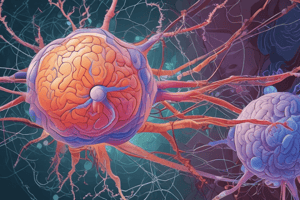Podcast
Questions and Answers
If a student discovers an Akt protein that is always active, which of the following would most likely increase?
If a student discovers an Akt protein that is always active, which of the following would most likely increase?
- Inhibition of cell apoptosis
- Phosphorylation of the Bad protein (correct)
- Degradation of Bcl-2 protein
- Activation of cyclin-CDK complexes
Which term describes the activation of many protein kinases in a signal transduction pathway?
Which term describes the activation of many protein kinases in a signal transduction pathway?
- Signal termination
- Transduction
- Inhibition
- Amplification (correct)
What is the primary action of the cholera toxin on G protein?
What is the primary action of the cholera toxin on G protein?
- It enhances signal amplification. (correct)
- It inhibits receptor binding.
- It decreases the GTPase activity of G proteins.
- It promotes G protein degradation.
Which of the following is NOT involved in protein phosphorylation?
Which of the following is NOT involved in protein phosphorylation?
What is the correct target for ubiquitylation by the active anaphase-promoting complex (APC)?
What is the correct target for ubiquitylation by the active anaphase-promoting complex (APC)?
Which protein domain binds receptor phosphotyrosine residues?
Which protein domain binds receptor phosphotyrosine residues?
What is an ubiquitin protein primarily known for?
What is an ubiquitin protein primarily known for?
What happens to cyclin levels when MPF activity increases?
What happens to cyclin levels when MPF activity increases?
Flashcards
Akt Kinase and Apoptosis
Akt Kinase and Apoptosis
The phosphorylation of Bad protein is increased by an always-active Akt kinase. This prevents apoptosis, or programmed cell death.
Signal Amplification in Protein Kinases
Signal Amplification in Protein Kinases
Protein kinases amplify signals by activating a cascade of reactions. Each activated kinase can activate many molecules, multiplying the signal.
Cholera Toxin and G Protein
Cholera Toxin and G Protein
Cholera toxin causes the G protein to remain permanently activated. This leads to excessive production of cAMP, resulting in fluid secretion in the intestines.
mTOR Kinase and Tyrosine
mTOR Kinase and Tyrosine
Signup and view all the flashcards
Anaphase-Promoting Complex and Securin
Anaphase-Promoting Complex and Securin
Signup and view all the flashcards
P13 Kinase and SH2 Domain
P13 Kinase and SH2 Domain
Signup and view all the flashcards
Ubiquitin Protein
Ubiquitin Protein
Signup and view all the flashcards
Adaptor Protein Function
Adaptor Protein Function
Signup and view all the flashcards
Study Notes
Akt Protein Mutation
- A mutated Akt protein, where the kinase is always active, will cause an increase in the phosphorylation of the Bad protein.
Protein Kinases in Signal Transduction
- The activation of many protein kinases in signal transduction pathways is an example of amplification.
Cholera Toxin and G Proteins
- The basic effect of cholera toxin on G proteins is signal amplification, rather than hydrolysis of GTP or activation of inhibitory proteins.
Protein Phosphorylation
- Enzyme activation, activation of protein kinase molecules and activation of receptor tyrosine kinases are involved in protein phosphorylation. Regulation of transcription factors is not involved.
mTOR Kinase
- Akt activation is stimulated by mTOR, mTOR stimulates cell growth, and mTOR is activated in the presence of cytokine. mTOR does not stimulate protein degradation and is not a tyrosine kinase.
Anaphase-Promoting Complex (APC)
- The target for ubiquitylation by the active anaphase-promoting complex (APC) is securin.
SH2 Domain
- P13 Kinase binds receptor phosphotyrosine residues via its SH2 domain.
Ubiquitin Protein
- Ubiquitin proteins are proteins that tag another protein for proteolysis.
Signaling Protein Domains
- A signaling protein made up of one SH2 domain and two SH3 domains is most likely an adaptor protein.
Cell Cycle Response to Go-Ahead Signal
- Mammalian cells complete the cell cycle and divide in response to a go-ahead signal.
Platelet-Released Substance
- Platelets release PDGF (platelet-derived growth factor) in the vicinity of an injury.
Cyclin
- Cyclin levels decrease when MPF (maturation-promoting factor) activity increases.
Yeast Signal Transduction
- Yeast cells produce signal molecules that directly interact with each other in signal transduction.
Neuron Response to Neurotransmitter
- The neurotransmitter acts as a signal molecule in a neuron's response.
Decline of MPF Activity
- The decline of MPF activity at mitosis is due to degradation of cyclin.
Spindle Checkpoint
- The spindle checkpoint determines chromosome attachment to the metaphase plate.
Insulin Receptor Activation
- The binding of two insulin molecules, causes dimerization following ligand binding, and results in activation of the PI-3 kinase pathway. Activation of the Ras/MAPK pathway is not a part of the initial activation process.
Phosphorylation of Amino Acids
- Protein kinases phosphorylate serine, threonine, and tyrosine.
Ras Activation
- Ras is activated early in the signal transduction pathway.
Cyclin-CDK Complexes
- Cyclin-CDK complexes control progression through the cell cycle.
Studying That Suits You
Use AI to generate personalized quizzes and flashcards to suit your learning preferences.

